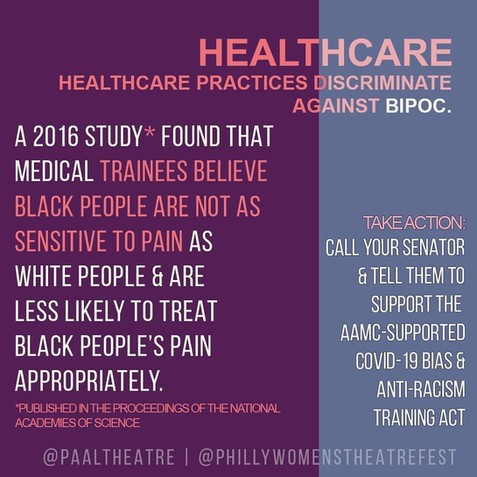Anti-Racism & Caregiver Support
- PAAL

- Mar 9, 2021
- 4 min read
"I have to fight for creative, collaborative recognition as a woman. I have to fight for it as a mother. And I also have to fight for it as a person of color. As a black stage manager and mother, the struggle against being the kind, hard-working Mammy in the room who takes care of everything is real."
- Carmelita Becnel, “Fighting for Gender, Race, and Motherhood in Theatre” | HowlRound PAAL Series
"Dr. Robin DiAngelo, author of White Fragility says, “You cannot talk about any other issue without talking about how race informs that issue.” When we don’t view systematic inequity through the lens of race and racism, our anti-oppression practice remains rooted in oppressive values and inactive language."
- Nicole Brewer,
"Black [women] stagnate in their careers and are less likely than white women to make it to executive level positions; when they do, they are often put in charge of organizations that are in disrepair. Black [women] are also more likely to be watched over by their white counterparts, which leads to lower performance reviews."
- Nicole Brewer,
You cannot have an anti-racist organization without formal caregiver support. Caregiver discrimination and/or neglect in the workplace impacts Black, Indigenous, People of Color caregivers more than any other group. Centering Black, Indigenous, People of Color parents and caregivers is just and results in greater equity for all initiatives and programming that develops from this center. It's vital not only to recognize and advocate for anti-racism and its intersection with parenting and caregiving, but to advocate for parenting and caregiving support so that anti-racist efforts and restorative justice reach Black, Indigenous, People of Color who are parents and caregivers.
The following is a brief summation, non-exhaustive but investigative, exploration of the realities of Black, Indigenous, People of Color who identify as mothers, compiled for #IntlMotherArtistDay - a partnership with Philadelphia Women's Theatre Festival - researched, curated, and led by Tamanya Garza, director and PAAL Director of Community and Justice Initiatives:
"When we don’t view systematic inequity through the lens of race and racism, our anti-oppression practice remains rooted in oppressive values and inactive language."
- Nicole Brewer,
Creator, Founder Concientious Theatre Training, PAAL Board of Directors | "Parents of Color and The Need For Anti-Racist Theatre Practices"
Equitable Support Systems | by Nicole Brewer
The following call to action for institutions was written exclusively for the PAAL Handbook by Nicole Brewer, creator and founder of Conscientious Theatre Training and Anti-Racist Theatre (ART) and PAAL Board member, and included in her article on HowlRound theater commons "Parents of Color and The Need For Anti-Racist Theatre Practices":
I want to offer some ways organizers and organizations can work to recognize, address, and counter bias and racism to standardize equitable support systems for parent-artists of color:
Make sure the historically invisible communities have a say and a stake in the resources provided for parents and caregivers by centering the most vulnerable among us.
Implement institutional-wide policy and protocols. The problem with case-by-case parent support is that it allows bias to influence language used to describe working parents, which in turn determines an institution’s willingness or reluctance to grant parent support. For instance, bias in language ascribes negative or positive words to different parents for doing the same action, e.g. a white mother who brings her infant to work is “hardworking” and a mother of color who brings her school-age child to work is “unprofessional”; a father who brings his children to work is “a good dad” but a mother who does the same is “a mess.”
Develop a written public anti-racist ethos outlining your commitment to anti-racist and anti-oppression parent support work. Be honest about your institution’s past and present bias, prejudice, and racist behavior toward caregivers and create pathways of accountability that ensure those oppressive values don’t resurface.
Sustain child-positive practices rather than child- or family-friendly practices. “Child positive” is a term I use to refer to the purposeful inclusion of children in any space by accounting for their needs, abilities, and limitations. All of these factors impact how children, parents, and non-parental people function in a space and determine whether or not the needs of all participants are being met, valued, and centered. “Child friendly,” on the other hand, is akin to tolerating the presence of children with minimal attention given to how they impact others and the space.
Invest in anti-bias training that provides people with resources to address and mitigate microaggressions to children from adults and from children to children.
Apply principles of restorative justice to how you integrate parent-support policies:
harm reduction
harm prevention
relationship repair
"For example, my gender and race make me susceptible to lower pay; people like me earn roughly $0.74 for every dollar a white man earns. [Women] are more likely to be penalized for taking time off work to care for children or aging family members than men. Black [women] stagnate in their careers and are less likely than white women to make it to executive level positions; when they do, they are often put in charge of organizations that are in disrepair. Black [women] are also more likely to be watched over by their white counterparts, which leads to lower performance reviews.
- Nicole Brewer,
Creator, Founder Concientious Theatre Training, PAAL Board of Directors | "Parents of Color and The Need For Anti-Racist Theatre Practices"




























Comments